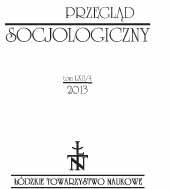NAMYSŁ – ROZMOWA – DZIAŁANIE. TEORETYCZNY MODEL PUBLICZNEJ DELIBERACJI
REFLECTION – COMMUNICATION – ACTION. THEORETICAL MODEL OF PUBLIC DELIBERATION
Author(s): Marcin ZgiepSubject(s): Politics / Political Sciences
Published by: Łódzkie Towarzystwo Naukowe
Keywords: deliberative democracy; public deliberation; communication; reciprocity principle; reciprocal argumentation; formal model; empirical context
Summary/Abstract: This article advances a novel theoretical account of deliberation with an embedded practical dimension. On the one hand, it has been inspired by the influential linguistic model elaborated by Karl Büler and Roman Jakobson. On the other hand, it draws upon the empirical studies of deliberation (J. Fishkin et al., J. Reykowski et al., A. Bächtiger et al. etc.) as well as on observations and analyses of public consultations and contemporary debates. The account laid out in the article encompasses two concomitant and complementary aspects: 1) formal approach to the process of deliberation consisting of reflection („depth of deliberation”), communication („width of deliberation”) and action („effectiveness of deliberation”), and 2) diverse references to external reality, or the „empirical context” of deliberation which enables to disclose the concrete real-world manifestations of the process, identify its limitations and capture the similarities and differences in relation to specific components of the formal model (space, time, actors, discussed issues or themes etc.). Therefore this structuro-functional conceptualization accounts for an attempt to cross the division between normatively-oriented theory, scientific research, and socio-political praxis while maintaining the distinctive role of all these sub-fields within the general domain of human activity.
Journal: Przegląd Socjologiczny
- Issue Year: 62/2013
- Issue No: 4
- Page Range: 43-65
- Page Count: 23
- Language: Polish

